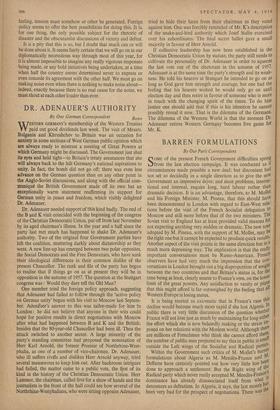DR. ADENAUER'S AUTHORITY
By Our German Correspondent Bonn WESTERN GERMANY'S membership of the Western Treaties paid out good dividends last week. The visit of Messrs. Bulganin and Khrushchev to Britain was an occasion for anxiety in some sections of West German public opinion which are always ready to mistrust a meeting of Great Powers at which Germany might be discussed. The Government just shut' its eyes and held tightâto Britain's treaty assurances that she will always back to the hilt Germany's national aspirations to unity. In fact, the bomb did not go off; there was even less advance on the German question than on any other point in the Anglo-Soviet discussions, and along with the official com- muniqu6 the British Government made off its own bat an exceptionally warm statement reaffirming its support for German unity in peace and freedom, which visibly delighted Dr. Adenauer.
Dr. Adenauer needed support of this kind badly. The end of the B and K visit coincided with the beginning of the congress of the Christian Democratic Union, put off from last November by its aged chairman's illness. In the year and a half since the party last met much has happened to shake Dr. Adenauer's authority. Two of the original four Government parties have left the coalition, muttering darkly about dictatorship as they went. A new line-up has emerged between two polar opposites, the Social Democrats and the Free Democrats, who have sunk their ideological differences in their common dislike of the present Chancellor. The rank and file of the party has begun to realise that if things go on as at present they will be in opposition in the autumn of 1957. The question at the Stuttgart congress was : Would they dare tell the Old Man?
One member tried the foreign policy approach, suggesting that Adenauer had failed to follow through the 'active policy on German unity' begun with his visit to Moscow last Septem- ber. Adenailer's answer to this was tailor-made for him in London : he did not believe that anyone in their wits could hope for positive results in direct negotiations with Moscow after what had happened between B and K and the British; besides that the 80-year-old Chancellor had been ill. Then the attack switched to another sector. A large minority of the party's standing committee had proposed the nomination of Herr Karl Arnold, the former Premier of Northrh ine-West- phalia, as one of a number of vice-chairmen. Dr. Adenauer, who ill suffers rivals and dislikes Herr Arnold anyway, tried several manoeuvres to keep him out. After backroom intrigues had failed, the matter came to a public vote, the first of its kind in the history of the Christian Democratic Union. Herr Lemmer, the chairman, called first for a show of hands and the journalists in the front of the hall could see how several of the Northrhine-Westphalians, who were sitting opposite Adenauer, tried to hide their faces from their chairman as they voted against him. One was forcibly reminded of Mr. K's description of the snake-and-bird authority which Josef Stalin exercised over his subordinates. The final secret ballot gave a small majority in favour of Herr Arnold.
If collective leadership has now been established in the Christian Democratic Union by statute, the party still needs to cultivate the personality of Dr. Adenauer in order to squeeze the last vote out of the electorate in the autumn of 1957. Adenauer is at the same time the party's strength and its weak- ness. He told his hearers at Stuttgart he intended to go on as long as God gave him strength and courage, but one had the feeling that his hearers wished he would only go on until election day and then retire in favour of someone who is more in touch with the changing spirit of the times. To do him justice one should add that if this is his intention he cannot possibly reveal it now. That is the dilemma of the Germans. The dilemma of the Western World is that the moment Dr. Adenauer retires Western Germany becomes free game for Mr. K.










































 Previous page
Previous page